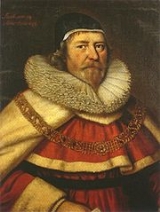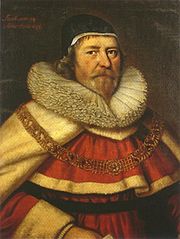
John Bankes
Encyclopedia

Chief Justice
The Chief Justice in many countries is the name for the presiding member of a Supreme Court in Commonwealth or other countries with an Anglo-Saxon justice system based on English common law, such as the Supreme Court of Canada, the Constitutional Court of South Africa, the Court of Final Appeal of...
to King Charles I of England
Charles I of England
Charles I was King of England, King of Scotland, and King of Ireland from 27 March 1625 until his execution in 1649. Charles engaged in a struggle for power with the Parliament of England, attempting to obtain royal revenue whilst Parliament sought to curb his Royal prerogative which Charles...
during the English Civil War
English Civil War
The English Civil War was a series of armed conflicts and political machinations between Parliamentarians and Royalists...
. He was one of the most prominent members of the Bankes
Bankes
The Bankeses were an important aristocratic family in Dorset, England for over 400 years. They owned large portions of land throughout Dorset and made significant contributions to the political history and development of the country.-Buildings:...
family of Dorset
Dorset
Dorset , is a county in South West England on the English Channel coast. The county town is Dorchester which is situated in the south. The Hampshire towns of Bournemouth and Christchurch joined the county with the reorganisation of local government in 1974...
. Corfe Castle
Corfe Castle
Corfe Castle is a village and civil parish in the English county of Dorset. It is the site of a ruined castle of the same name. The village and castle stand over a gap in the Purbeck Hills on the route between Wareham and Swanage. The village lies in the gap below the castle, and is some eight...
, his family seat was destroyed during a long siege, in which his wife became known as Brave Dame Mary.
Early life
Sir John was admitted a commoner of Queens College, Oxford, in 1604, at 15 years of age, but left the university before he took a degree, and settled in Gray's Inn, where he distinguished himself by his uncommon application to the study of the law, in which he acquired great eminence and reputation. He was Lent Reader and treasurer to that society. He was M.P. for MorpethMorpeth (UK Parliament constituency)
Morpeth was a borough constituency centred on the town of Morpeth in Northumberland represented in the House of Commons of the Parliament of England until 1707, the Parliament of Great Britain from 1707 to 1800, and then the Parliament of the United Kingdom....
in 1626 and 1628, and was knighted in 1631. He was also appointed attorney to Prince Charles. In September 1634 he became attorney-general to the King, holding this position during the litigation of John Hampden
John Hampden
John Hampden was an English politician, the eldest son of William Hampden, of Hampden House, Great Hampden in Buckinghamshire, John Hampden (ca. 15951643) was an English politician, the eldest son of William Hampden, of Hampden House, Great Hampden in Buckinghamshire, John Hampden (ca. 15951643)...
's famous cause of ship money
Ship money
Ship money refers to a tax that Charles I of England tried to levy without the consent of Parliament. This tax, which was only applied to coastal towns during a time of war, was intended to offset the cost of defending that part of the coast, and could be paid in actual ships or the equivalent value...
; and his argument upon that great question is still extant. He was also counsel for Cambridge University in 1634-5.
Corfe Castle
Sir John Bankes purchased Corfe CastleCorfe Castle
Corfe Castle is a village and civil parish in the English county of Dorset. It is the site of a ruined castle of the same name. The village and castle stand over a gap in the Purbeck Hills on the route between Wareham and Swanage. The village lies in the gap below the castle, and is some eight...
with all its manors, rights, and privileges in 1635 from the Lady Elizabeth Coke, who was the first of this family to settle in the county of Dorset. His ancestors for many generations held property in and near Keswick
Keswick, Cumbria
Keswick is a market town and civil parish within the Borough of Allerdale in Cumbria, England. It had a population of 4,984, according to the 2001 census, and is situated just north of Derwent Water, and a short distance from Bassenthwaite Lake, both in the Lake District National Park...
in Cumberland
Cumberland
Cumberland is a historic county of North West England, on the border with Scotland, from the 12th century until 1974. It formed an administrative county from 1889 to 1974 and now forms part of Cumbria....
. The Title deeds and grants from the Crown of the black lead mine at Borrowdale date back as far as Henry VI
Henry VI of England
Henry VI was King of England from 1422 to 1461 and again from 1470 to 1471, and disputed King of France from 1422 to 1453. Until 1437, his realm was governed by regents. Contemporaneous accounts described him as peaceful and pious, not suited for the violent dynastic civil wars, known as the Wars...
. and Edward IV
Edward IV of England
Edward IV was King of England from 4 March 1461 until 3 October 1470, and again from 11 April 1471 until his death. He was the first Yorkist King of England...
and were again renewed under the seal of James I
James I of England
James VI and I was King of Scots as James VI from 24 July 1567 and King of England and Ireland as James I from the union of the English and Scottish crowns on 24 March 1603...
.
Lord Chief Justice and death
In January 1640 he was made Chief Justice of the Common PleasChief Justice of the Common Pleas
The Court of Common Pleas, also known as the Common Bench or Common Place, was the second highest common law court in the English legal system until 1880, when it was dissolved. As such, the Chief Justice of the Common Pleas was one of the highest judicial officials in England, behind only the Lord...
, and afterwards followed his majesty from Westminster to York
York
York is a walled city, situated at the confluence of the Rivers Ouse and Foss in North Yorkshire, England. The city has a rich heritage and has provided the backdrop to major political events throughout much of its two millennia of existence...
; having left his lady Mary Bankes
Mary Bankes
Lady Mary Bankes née Hawtry was a Royalist who defended Corfe Castle from a three-year siege during the English Civil War from 1643 to 1646...
to defend Corfe Castle, which she did with great courage, until it was betrayed into the hands of the rebels. His name is signed to the engagement with the lords at York, in June 1642. In the same year he was sworn of the privy council
Privy council
A privy council is a body that advises the head of state of a nation, typically, but not always, in the context of a monarchic government. The word "privy" means "private" or "secret"; thus, a privy council was originally a committee of the monarch's closest advisors to give confidential advice on...
, and the degree of LL.D. conferred upon him at Oxford
Oxford
The city of Oxford is the county town of Oxfordshire, England. The city, made prominent by its medieval university, has a population of just under 165,000, with 153,900 living within the district boundary. It lies about 50 miles north-west of London. The rivers Cherwell and Thames run through...
, where he died on 28 December 1644, aged 55, and was buried in the cathedral of Christ Church, where is a monument to his memory. In 1644, he was at first mentioned in the list of those persons meant to be excepted out of the general pardon; his name was afterwards struck out of that list, but he was notwithstanding impeached of high treason. His estates and property however passed to his eldest son Sir Ralph Bankes
Ralph Bankes
Sir Ralph Bankes was a courtier of the restored Charles II and a knighted member of the Privy Chamber. He is most notable for being the builder of Kingston Lacy, the restored seat of the Bankes family....
, who became an MP and built the estate of Kingston Lacy
Kingston Lacy
Kingston Lacy is a country house and estate near Wimborne Minster, Dorset, England, now owned by the National Trust. From the 17th to the late 20th centuries it was the family seat of the Bankes family, who had previously resided nearby at Corfe Castle until its destruction in the English Civil War...
.

